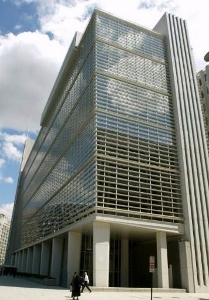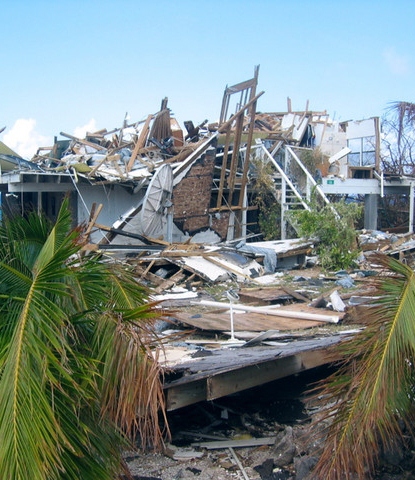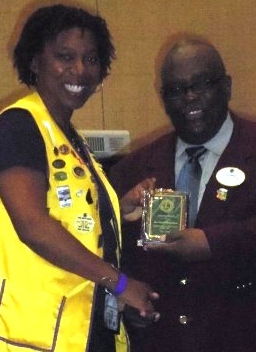Archive for June, 2012

Lunchtime web screening of Grouper Moon
 (CNS): Changing Seas an on-line public service television channel will be showing a screening of Grouper Moon this lunchtime at 1:30pm. The show features the endangered local fish at one of the last remaining spawning holes in the region in Little Cayman. The online channel is also offering the opportunity for viewers to chat live with local and international researchers who are involved in the fight to project this critically important spawning area and to help rescue the fish from danger after significant over fishing has depleted their numbers.
(CNS): Changing Seas an on-line public service television channel will be showing a screening of Grouper Moon this lunchtime at 1:30pm. The show features the endangered local fish at one of the last remaining spawning holes in the region in Little Cayman. The online channel is also offering the opportunity for viewers to chat live with local and international researchers who are involved in the fight to project this critically important spawning area and to help rescue the fish from danger after significant over fishing has depleted their numbers.
Go to www.ustream.tv/channel/changing-seas to watch the show today.

World Bank banned CHEC
 (CNS): The Chinese company that the Cayman Islands government is negotiating with over the development of cruise berthing facilities has been banned by the World Bank because of fraud and corruption. The parent company of China Harbour Engineering Company (CHEC), China Communications Construction Company Limited (CCCC), has been barred from being involved in projects financed by the global bank since 2009 under its fraud and corruption sanctioning policy. The revelation was made by the Jamaica’s Contractor-General, Greg Christie, who has raised concerns about developments in that country which were given to the Beijing based firm.
(CNS): The Chinese company that the Cayman Islands government is negotiating with over the development of cruise berthing facilities has been banned by the World Bank because of fraud and corruption. The parent company of China Harbour Engineering Company (CHEC), China Communications Construction Company Limited (CCCC), has been barred from being involved in projects financed by the global bank since 2009 under its fraud and corruption sanctioning policy. The revelation was made by the Jamaica’s Contractor-General, Greg Christie, who has raised concerns about developments in that country which were given to the Beijing based firm.
Cayman Islands Premier McKeeva Bush, who is facing opposition from the UK's Foreign and Commonwealth Office over his decision to negotiate with CHEC outside internaitonal procurement standards, has insisted since he moved into exclusive talks with the firm last year that it is thebest company for the job.
However, the revelations about the World Bank's ban on the firm adds fuel to the mounting controversy in the region regarding the firm and its involvementin various Caribbean capital projects. The bank has stated that any firm directly or indirectly controlled by CCCC is ineligible for any World Bank financed contracts related to roads and bridges during the period 12 January 2009 to 12 January 2017, which automtically extends to CHEC as it is a major subsidary of CCCC.
In its efforts to combat corruption in public sector contracting the bank prohibits member countries from awarding World Bank-financed contracts to any of the firms or individuals that it has sanctioned. Christie has questioned whether the government in Jamaica had identified CHEC’s debarred status.
“Now that it is known that the World Bank, in the judicious application of its anti-fraud and anti-corruption policies in public contracting, has had cause to sanction and to debar CCCC and CHEC from receiving World Bank financed contracts, the obvious question that now arises is whether this is something that the government, as a matter of good, prudent and diligent business practice, intends to be guided by in the award of its own contracts that are financed from non-World Bank sources,” Christie said, adding that the revelation must be set against the backdrop of other controversies surrounding CHEC.
According to the Jamaican media, China Harbour Engineering Company (CHEC) has rejected the concerns, stressing that it was not involved in and had never been involved in any activity that has attracted sanctions by the World Bank.
It said the issue related to 2003 and involves the China Road and Bridge Group, which was later taken over by CCCC in 2005. CHEC claimed its parent company came under the debarment in 2011 based on changes made at that time to the World Bank system.
The Cayman premier signed an MOU with CHEC last year and has been in negotiations ever since to build two finger piers in George Town with an extensive upland development, a well as a pier in West Bay and the redevelopment of the jetty in Spotts as a bad weather alternative for cruise ships to anchor
The talks have been embroiled in controversy because of concerns about the firm, the way it was selected by the premier and exactly how the escalating cost of the project will ultimately be met. CHEC has agreed to design, build and finance the project and recoup its investment over a period of fifty years but it is not clear what share of the port fees, which normally go to the public coffers, will be redirected to CHEC.

‘Gasboy’ still being abused
 (CNS): Full story — Government has done very little to mitigate the risk of abuse of its fuel card system, Auditor General Alastair Swarbrick has found in his latest report, despite the revelations in 2010 by his office about the potential loss of some $500,000 per year to the public purse. In the latest report on the GASBOY fuel card system, published Tuesday morning, many of the problems first identified by the internal audit unit and exposed by the former auditor general have not been addressed. Swarbrick said that although the five agencies included in the first audit have made progress, the recent examination of a further twelve government entities has found many of the same failures and mismanagement.
(CNS): Full story — Government has done very little to mitigate the risk of abuse of its fuel card system, Auditor General Alastair Swarbrick has found in his latest report, despite the revelations in 2010 by his office about the potential loss of some $500,000 per year to the public purse. In the latest report on the GASBOY fuel card system, published Tuesday morning, many of the problems first identified by the internal audit unit and exposed by the former auditor general have not been addressed. Swarbrick said that although the five agencies included in the first audit have made progress, the recent examination of a further twelve government entities has found many of the same failures and mismanagement.
He said he had found 97 gas cards still assigned to ex-employees within ten of the departments audited, some 65 cards assigned to employees who have no business need to have them and 28 employees with more than one fuel card issued in their name.
“I am disappointed that appropriate action has not been taken across government in the last two years to develop better practices for the distribution of fuel,” said Swarbrick. “The opportunity for abuse of the system is still a significant risk today.”
The report found that the overall control of the environment has not improved, leaving the system vulnerable to abuse and fraud.
However, Swarbrick did point to some significant improvements in the first five agencies reviewed in the original report. These entities were the highest consumers of fuel and most had acted on the recommendations of the previous auditor general, Dan Duguay, by addressing the surplus cards in circulation, documenting policies and procedures for fuel management and improving controls.
According to the work of the internal unit, the police, the Public Works Department, the Water Authority and the National Roads Authority all made efforts to address the problem. However, despite frequent requests for information, the Department of Environment Health failed to respond and the audit office was unable to establish if any measures had been implemented to stop the abuse, Swarbrick said.
The DoEH is the largest consumer of fuel of any government agency and although the department did not cooperate with the auditor general, according to its spending figures, since the last report it had reduced its fuel consumption by over $11,000. Between January 2008 and March 2009 the DoEH spent $48,714 on fuel, but between July 2009 and June 2010 that had dropped to $37,554.
The latest report shows that across government fuel spending has fallen by over $475,000. Although this was close to the figure which was estimated to be the amount being lost as a result of abuse and mismanagement in the original report, Swarbrick said the fall could also be as a result of other issues, such as fluctuating fuel costs as well as better controls by the top five users.
But Swarbrick pointed out that the same problems remained among the other agencies which were not previously assessed, even though many of themare in the same ministry as those in the original audit. Swarbrick said it was disappointing that the recommendations had been ignored by other government entities despite the widespread knowledge in the ministries of the recommendations.
“It is clear no one took responsibility in the rest of government to implement the recommendations,” Swarbrick said as he added that government had a duty to prevent abuse of public funds. “Action wasn’t taken across government, so there is still a significant risk.”
However, he said he was encouraged that the deputy governor has now made a commitment to take the lead on the issue and tasked all chief officers to implement the recommendations ahead of the introduction of a new system of fuel management expected to be in place by the end of next month.

Eco-bill still in limbo on world environment day
 (CNS): In his message to mark World Environment Day UN Secretary-General Ban Ki Moon spoke about the need for a paradigm shift towards a more sustainable world. Here in the Cayman Islands however, there is still no legislation in place to protect the natural environment. As the world gears up for the sustainable development conference in Rio, myriad unique and endangered species of flora and fauna remain at risk locally as yet another government fails to enact the necessary legislation. As the world moves to discuss the importance of sustainability in future development, Cayman’s development laws cannot even protect essential mangrove buffer.
(CNS): In his message to mark World Environment Day UN Secretary-General Ban Ki Moon spoke about the need for a paradigm shift towards a more sustainable world. Here in the Cayman Islands however, there is still no legislation in place to protect the natural environment. As the world gears up for the sustainable development conference in Rio, myriad unique and endangered species of flora and fauna remain at risk locally as yet another government fails to enact the necessary legislation. As the world moves to discuss the importance of sustainability in future development, Cayman’s development laws cannot even protect essential mangrove buffer.
Since 2000 successive governments have promised but continued to fail to enact any kind of meaningful legislation to protect the environment. The most recent law the National conservation bill remains in limbo after enduring several years of consultation. Although government finished its last round of public discussion more than 18 months ago, it has not yet decided how to move forward with the critical legislation.
The minister responsible, like others before him had stated that the law was a priority for his ministry when he was elected to office in May 2009 but three years later the bill remains stalled. In January this year Jennifer Ahearn, the chief officer in the ministry, told CNS that the ministry was deciding whether to change the bill based on the input received during the last consultation period, or to let the bill go forward as drafted.
“Discussions on that have not yet happened,” the chief officer admitted at the time.
Meanwhile, the director of the Department of Environment (DoE) has persistently warned of the pressing need for legislation the clock is ticking on the islands’ precarious environmental resources.
Gina Ebanks-Petrie has repeatedly stated that at the very least environmental considerations need to be given equal weight in planning and development decisions as other factors such as socio-economic impacts. The proposed bill has been much misunderstood, and the department’s director has said that it would not enable the seizure of people’s private land by government. The only land that can be preserved for environmental purposes under the draft bill is that belonging to the crown. Ebanks-Petrie said it will not stop development but merely requires the country’s natural resources to factor equally in development decisions.
From the silver thatch palm and the banana orchid to Cayman’s unique bats and reptiles,few of the islands’ indigenous species currently have any kind of legislative protection.
Despite wide support across the community for the legislation, with media straw polls persistently showing around three quarters of the population in favour of passing the current draft law, the government has still not been persuaded of the urgency required regarding the legislation. The draft bill has been re-written several times but a vocal minority has been able to hold the bill hostage.
Cayman is now only five months away from the implementation of its Bill of Rights as set down in the 2009 constitution which refers to environmental rights. Unless the law is passed, the environment will not be protected in direct contravention of section 18, which states that government should adopt legislation to protect wildlife and local biodiversity.

Reply to 101: Learning Lessons
101 is eager to ridicule our two political parties, to say there is nothing to choosebetween them and to throw both in the bin. I do not think 101 can be faulted for wanting to get rid of UDP government. It is clear to all of us that the UDP offers one thing only – Bush rule. We have all seen Bush rule in action, and there is no reason to think that it would improve if Bush were re-elected as premier.
On top of his failings as a ruler and the question whether we want a ruler or a government, there are strong suspicions of large-scale corruption, made worse by his explanation of the Thomas affair. So it would indeed be a grim day for the Cayman Islands if voters chose four more years of Bush rule.
On the other hand 101’s suggestion that a PPM government would be no better than Bush rule is facile and unworthy – if this is meant to be a realistic assessment of the situation. The explanation may be that the Viewpoint is really propaganda for an independent candidate.
In order to slam the PPM government of 2005-09, 101 repeats the UDP propaganda about financial mismanagement. This was the propaganda that won the election for Bush and his team in 2009. But I suspect 101 understands that the truth is not so simple. And I hope 101 recognises that it is important for the country’s future that the truth be understood and the lessons of the financial crisis learned.
The PPM government was elected in 2005 on a manifesto that made plain that it would give first priority to the country’s education system. Our existing system was suffering from neglect, it was inadequate and over-stretched, and this was having very serious long-term effects. The government set out to overhaul the system, change attitudes to education and provide the best facilities that the country could afford. Thus far I do not think anyone would fault the government.
The mistake was in not making their own assessment of what the country could afford. The financial secretary gave the project his thumbs-up and there was no reason to doubt his assessment. Under the Constitution (then) it was the financial secretary’s responsibility to make the assessment, and he had the data and the expertise to make it. We still do not have reliable figures but we do know that the financial secretary made a radical reassessment after the 2009 election. And from his explanation to the LA it emerged that he had a very restrictive view of what his responsibility entailed. He just passed on figures given to him by others.
It does not matter now whether the FS was wrong about his responsibility. I am not talking about blame but about the lessons the financial crisis teaches us. One of the most important lessons is that in future the elected government must ensure that large projects are undertaken only with a reliable assessment of affordability – and of feasibility, cost, impact and benefit. Those who make the assessments and advise on financing must take responsibility for what they say; and the elected government must satisfy itself that the assessments and advice have been given properly and carefully, with due regard for margins of error.
I am not suggesting that the elected government should ignore what the civil servants are saying. Far from it. We have seen in recent years the mess that is created by a premier who thinks he knows best on all subjects.
This is only one of the lessons that the financial crisis should have taught us. Another, underlined by the Miller/Shaw report, is the absolute necessity of bringing the operating costs of government under effective oversight and control. This was the responsibility of the civil service itself. When the Cabinet was told there might be an operating deficit for ‘08/’09 it immediately put pressure on the civil service to cut costs. But with hindsight we can see that this was not enough. With the new Constitution the responsibility for government finances is in the hands of the minister for finance.
Another lesson is that raising taxes to make up the government deficit can do more harm than good. The key thing in a financial crisis is to support and encourage private business, especially our pillar industries, and to restore confidence. This was emphasised in the PPM’s 2009 manifesto. It is increasingly recognized by governments around the world as the global crisis continues.
I think it is fair to say that the Bush government has ignored all of the lessons. The premier sees such lessons and the ordinary principles of good governance as obstacles to be evaded when doing what he wants. So we have the embarrassment of the UK forcing our premier to sign an agreement to observe some fundamentals – not that there is any sign that he truly accepts any of them. He prefers confrontation.
In my opinion voters need to choose a team, one that could form a government with its leader as premier; and it should be a team that believes in good governance, shows that it understands the lessons of the financial crisis, and will restore confidence and the rule of law. That is the only way voters can obtain a government that will take care of them and the country.
The PPM is assembling such a team. That has been the main mission of the PPM since the first members came together ten years ago. The PPM team will certainly include new faces; it already has a new leader. I hope voters will examine the team and its manifesto with care before making their decision. Of course the performance and achievements of the previous PPM government should be scrutinized, but where mistakes were made the question should be whether the lessons have been learned.
101 exhorts voters to vote for individuals regardless of party affiliation, if any. This is how we voted in 2000, and it led to the first Bush government. A lot of people used some of their votes this way in 2009, and it gave us the second Bush government. Let us not make the same mistake in 2013. Another lesson.
Independent candidates should be pressed to say who they would vote for as the next premier. Voters should choose their government, not leave it to the MLAs to make deals and compromises to suit themselves.

Millionaire peer raises Bush attack in UK Lords
 (CNS): A Conservative member of the UK’s House of Lord was probing government peers last week over comments made by the Cayman Islands premier deriding the current governor. According to the House of Lords’ Hansard, Lord Ashcroft asked government representatives in the British upper House what their assessment was of the comments made by McKeeva Bush about the UK appointed governor, Duncan Taylor. The FCO representative in the House of Lords, Lord Howell, said he was aware what Bush had said but there was no truth in the allegations and the governor had the UK government’s full support.
(CNS): A Conservative member of the UK’s House of Lord was probing government peers last week over comments made by the Cayman Islands premier deriding the current governor. According to the House of Lords’ Hansard, Lord Ashcroft asked government representatives in the British upper House what their assessment was of the comments made by McKeeva Bush about the UK appointed governor, Duncan Taylor. The FCO representative in the House of Lords, Lord Howell, said he was aware what Bush had said but there was no truth in the allegations and the governor had the UK government’s full support.
The question posed by the millionaire peer, who is facing media accusations in the UK about his own business dealings and entanglement with issues in the Turks and Caicos Islands, queried what the FCO felt about the attack by Bush on the governor and his conspiracy theories.
Ashcroft pointed in particular to the comments Bush made in a statement released to the press at the beginning of last month after the governor revealed that the premier was the subject of more than one police investigation. Bush had accused Taylor of doing "nothing of substance" to help the country and said he had "stealthily and insidiously undermined" government efforts to "get our economy off the ground and get jobs for people.”
In a widely publicised statement he had also accused Taylor of having “done nothing for three years to help us but to throw cold water on whatever we were trying to do", accusations strenuously denied by Taylor, who has persistently pointed to his directions to the premier to follow good governance practices.
Following Ashcroft’s question, the FCO’s Cabinet member and Tory peer, Lord Howell, said the British government was aware of the comments made by the premier attacking the governor and suggesting that there is a conspiracy to undermine the Cayman Islands, and assured Ashcroft that there was “no truth whatsoever in those suggestions.”
Howell pointed to the governor’s own comments when he said the “UK government's vision for the Cayman Islands was set out clearly during the visit by the Minister for the Overseas Territories, Henry Bellingham,” which, he went on to say, was a “vision of a flourishing and vibrant economy, whose public finances are well managed and whose adherence to internationally recognised standards of governance enhances its reputation as a good place to live, work and do business."
Howell said Governor Taylor shared Bellingham’s vision and that he “has our full support”, referring to the UK government.
Ashcroft has been the subject of media attention in the UK recently as a result of his possible connections to various dealings in the Turks and Caicos Islands. The UK’s Sunday newspaper,The Observer, reported this weekend that it had seen documents linking the wealthy lord to Allan Forrest, chief executive of the firm Johnston International, which collapsed in 2010 taking the Cayman based firm Hadsphaltic with it.
Ashcroft, however, has denied any legal, economic or beneficial interest in Johnston since 1999.
The BBC flagship investigative show Panorama also reported earlier this year that Ashcroft had misled the public and the stock exchange over his business interests in TCI.
The allegations also centred on Johnston which was believed to have funded a luxury mansion for Misick. In the programme Panorama alleged that Ashcroft had given the impression that he had no involvement in the firm when the mansion was being built but the evidence of 14 former employees and leaked company documents implied the peer controlled the firm at the time. The documents showed the peer issuing instructions, sometimes in his own handwriting, on how to run the company, the BBC said.
Ashcroft rejected the allegation he had deliberately misled the public and denied having any involvement in the day-to-day management of the construction firm for more than a decade.

Teen remains silent as murder case closes
 (CNS): The teenager accused of killing Asher McGaw in East End last September will not be offering any evidence in his own defence following the presentation of the crown’s case against him. Since his arrest, Chakane Jameile Scott has remained silent in the face of the accusations which are based on evidence given by teen witness, Antascio Rankine, who says he was there when Scott shot McGaw. The three men, who, the court heard, were all friends since childhood, were, according to the crown, in the grounds of the East End Clinic letting off a flare gun when Scott turned a revolver on Rankine and shot his friend three times in the head and body.
(CNS): The teenager accused of killing Asher McGaw in East End last September will not be offering any evidence in his own defence following the presentation of the crown’s case against him. Since his arrest, Chakane Jameile Scott has remained silent in the face of the accusations which are based on evidence given by teen witness, Antascio Rankine, who says he was there when Scott shot McGaw. The three men, who, the court heard, were all friends since childhood, were, according to the crown, in the grounds of the East End Clinic letting off a flare gun when Scott turned a revolver on Rankine and shot his friend three times in the head and body.
The crown closed its case against the teenager Friday, and although heavily based on Rankine’s eyewitness statements, the crown said it was bolstered by the evidence of the pathologist. The expert’s report on McGaw’s wounds concurred with Rankine’s account that he had heard three shots and seen Scott stand over McGaw and shoot his friend at close range after he had fallen over.
Defence attorney Sasha Wass confirmed that her client would not be testifying and the court adjourned until Tuesday, when the two lawyers will offer their closing arguments to the judge before he retires to decide the verdict. Justice Alex Henderson is hearing the case alone without a jury.
McGaw’s body was found in the early hours of 22 September by local police officers on routine patrol in John McLean drive a few yards from the clinic car park. McGaw had received multiple wounds to the head and body.
The police had first assumed the killing was a gang related shooting, coming during a period of frightening gang violence in which four young men had already been shot and killed and a fourth seriously injured in West Bay and George Town.
However, it was not until sometime later that Rankine told police what he had seen, indicating the murder was between friends and not gang rivals. The crown has offered no motive for the killing and no weapon has been recovered. Although other witnesses spotted the three boys together on the night of the killing, supporting Rankine’s account, there were no other witnesses or forensic evidence linking Scott to the shooting.
Although the teenager is one of the first people to be tried for murder following the change in the law regarding the caution given by police, he has opted to remain silent throughout. The court heard that the senior investigating officer had issued the new police caution to the teen on his arrest, which warns suspects that if they don’t say anything when interviewed by the police during the investigation but then come to court and present a defence, that could be harmful to their case and allow a judge or jury to draw an negative inference.

Planning encourages robust roof construction
 (CNS): The Department of Planning has partnered with the local building industry to present a new three part free lecture series focusing on bestpractices, particularly roof trusses, framing and uplift connections installation. Officials from the planning department said the series presents an invaluable opportunity to construction firms to learn more about best practice for building high-wind resistant roofs. “One of the main duties of the Department of Planning, is ensuring the building of robust and more specifically high wind-resistant structures,” said Director of Planning, Haroon Pandohie.
(CNS): The Department of Planning has partnered with the local building industry to present a new three part free lecture series focusing on bestpractices, particularly roof trusses, framing and uplift connections installation. Officials from the planning department said the series presents an invaluable opportunity to construction firms to learn more about best practice for building high-wind resistant roofs. “One of the main duties of the Department of Planning, is ensuring the building of robust and more specifically high wind-resistant structures,” said Director of Planning, Haroon Pandohie.
“This process of course starts from the design stage and through this lecture series we hope to engage contractors, architects, engineers and self-builders so everyone can be in compliance with the building code through all phases of development,” explained the planning boss
The free lecture series consists of three events: The first, scheduled for 13 June will address some common industry misconceptions around trusses, roof framing, uplift values and hurricane anchors. This workshop will also highlight appropriate design and installation techniques for trusses and roof framing; cover the required uplift values and help with the selection and installation of appropriate hurricane anchors.
The second is planned for 27 June in partnership with USP and Cox Lumber. Entitled USP Wind Design and Connections Seminar this tutorial will cover a range of topics including how load values are achieved; high wind probability and design wind speeds and code requirements. Participants will also be presented with several case studies on past natural disasters.
The final lecture on 17 July will be facilitated by Simpson Strong Tie and AL Thompsons, it will focus on wind resistant design and construction. Other topics include design criteria updates, effects of wind and wind damage, roof fastening and anchorage as well as special and wind resistant connectors.
“This is an invaluable opportunity to get updates as well as learn more about industry best practices when it comes to building high-wind resistant roofs. I therefore encourage as many members of the construction industry to attend,” Pandohie added.
People can register for the lectures series or individual workshops by e-mailing jacqueline.bleicher@gov.ky or calling 244-6574. Registration for the first workshop closes Friday, 8 June 2012.
Registration for the final workshop can be done online at www.strongtie.com; or by calling Lisa on 972 548-0924; or email lchumbley@strongtie.com. Registration deadline for this event is 13 July 2012.
Dates and details for the lectures are as follows:
Trusses, Roof Framing & Uplift Connections Workshop
When: 13 June 2012, 1 – 4pm
Where: Conference room 1038, Government Administration Building
Facilitator: Michael Pratt, MCP, CBO, Assistant Building Control Officer, Department of Planning
Registration deadline: 8 June 2012.
USP Wind Design & Uplift Connections Seminar (Offering 2 IA/CES LU/HSW)
When: 27 June 2012, 1 – 4pm
Where: Conference room 1038, Government Administration Building
Speaker: Randy Holgate, USP Director, Structural Connectors
Registration deadline: 22 June 2012.
Wind Resistant Design & Construction Workshop (Offering 5 PDHs)
When: Tuesday, 17 July 2012, 9am – 3pm (breakfast and lunch provided)
Where: AL Thompsons Building, 139 North Sound Road

Lions reap top award for hard work
 (CNS): A local service club has reaped on of the top honours at an international conference after being named Club of the Year a convention in Trinidad last month. The Lions Club of Tropical Gardens (LCTG) recognized for its contributions to the Cayman Islands community and its organizational skills, efficiency and quality of projects at the 32nd MD 60 Convention. Lion Lloyd Barker, MJF, District Governor of MD 60B told the Lions present at the convention that LCTG had accomplished all of his major goals for the lionistic year 2011-2012 and that the club had made him especially proud by sponsoring an Alpha Leo Club at the Clifton Hunter High school in Grand Cayman.
(CNS): A local service club has reaped on of the top honours at an international conference after being named Club of the Year a convention in Trinidad last month. The Lions Club of Tropical Gardens (LCTG) recognized for its contributions to the Cayman Islands community and its organizational skills, efficiency and quality of projects at the 32nd MD 60 Convention. Lion Lloyd Barker, MJF, District Governor of MD 60B told the Lions present at the convention that LCTG had accomplished all of his major goals for the lionistic year 2011-2012 and that the club had made him especially proud by sponsoring an Alpha Leo Club at the Clifton Hunter High school in Grand Cayman.
The club was also the recipient of several district and international awards. President, Lion Belinda Blessitt Vincent received the President of the Zone, Zone 4B award, secretary, Lion Norma McField, PMJF, was also awarded the Secretary of the Zone, Zone 4B.
The club also received an award for its Health and Wellness projects. Lion Melrose Gooding, MJF Zone Chairperson 4B District 60B and past president of LCTG received the International President Certificate of Appreciation Award in recognition of distinguished achievements in fulfilling the mission of Lions Club International.
Lion Elva Smith (President elect) was also appointed as a District Officer and will be part of the part of the Lions Club International Foundation (LCIF) team for the lionistic year, 2012-2013.
The convention provided opportunities for Lions to develop personal skills and to share lionistic experiences and was attended by Lions across the Caribbean region, the club said.
The Lions Clubs of Tropical Gardens in the Cayman Islands is a member of Multiple District 60 which includes the Lions Clubs in Anguilla, Antigua and Barbuda, Barbados, British Virgin Islands, Cayman Islands, Dominica, Grenada, Guyana, Jamaica, Montserrat, Netherlands Antilles, St. Kitts and Nevis, St. Lucia, St. Maarten, St. Vincent and the Grenadines, Suriname, Trinidad and Tobago and US Virgin Islands.
Lion President Belinda said the awards were a culmination to a year of hard work by her club and thanked members and friends of lions who helped to make the year a success and made “Passionate Members Working Together to Build a Better Community", the club theme a reality.

Robberies stir up concerns
 (CNS): With four robberies in one week on Grand Cayman after what seemed to be a lull in one of the most problematic crimes for the local economy, the Chamber of Commerce has urged businesses to be extra vigilant. During a seven-day period four local businesses were robbed by masked armed men; three of the incidents happened in the middle of the day. Although police managed to apprehend one lone robber at a business in Bodden Town, the other perpetrators remain at large. The Chamber said it was concerned over the implications for the business community with the surge of robberies, which are not only bad for business but could have “dire consequences” for the entire community.
(CNS): With four robberies in one week on Grand Cayman after what seemed to be a lull in one of the most problematic crimes for the local economy, the Chamber of Commerce has urged businesses to be extra vigilant. During a seven-day period four local businesses were robbed by masked armed men; three of the incidents happened in the middle of the day. Although police managed to apprehend one lone robber at a business in Bodden Town, the other perpetrators remain at large. The Chamber said it was concerned over the implications for the business community with the surge of robberies, which are not only bad for business but could have “dire consequences” for the entire community.
“The Chamber is concerned and deplores the recent upsurge of robberies within our community,” the business organisation said in a statement. “After a short period of reprieve local businesses are once again faced with the need to consider stricter security measures to protect their staff, property and assets. These types of crime not only have a direct effect on morale within the community, they also affect how we are viewed as a place to conduct business, invest and visit. We cannot tolerate this type of crime in the Cayman Islands without dire consequences.”
The Chamber encouraged all local businesses to work with the police but also to be extra vigilant throughout the working day and report any suspicious activity to the RCIPS or the Cayman Crime Stoppers 24 hour line on 800-TIPS.
The police are currently conducting an investigation into an armed robbery at the TV station’s WeststarTV customer service office, which occurred on the afternoon of 24 May when three masked men, two of whom were armed with what appeared to be guns, threatened staff and got away with several thousand dollars. The men were caught on CCTV and the station has offered a $10,000 reward.
The RCIPS is also looking for a man armed with a knife, who was involved in one of two daylight robberies on Wednesday 30 May. The suspect was also caught on camera outside the convenience store in Walkers Road wearing a yellow cloth around his head. Unarmed officers, however, bravely confronted and arrested an armed man as he attempted to flee an armed robbery at the Cashwiz pawn store in Bodden Town. On recovery the weapon was discovered to be an imitation gun and the man was arrested for robbery.
A third robber remains at large after a hold-up at the Texaco Gas station on Eastern Avenue at around 10pm on Thursday 31 May. So far police have failed to release descriptions or CCTV footage regarding the most recent heist.
In recent statistics released by the police the robberies reported for the first quarter of 2012 were down by 66% on those reported in 2011, an historically high year for robberies.